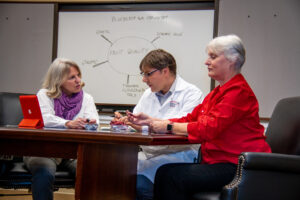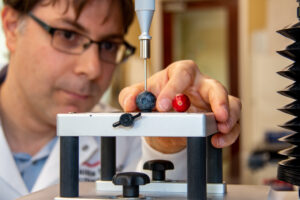PHHI team lands $12.8 Million to improve fruit quality of Blueberry and Cranberry
KANNAPOLIS, N.C. – With a long-term goal of improving blueberry and cranberry based on producer and consumer interests, NC State University scientists, Massimo Iorizzo, Mary Ann Lila and Penelope Perkins-Veazie, were awarded a four-year, $6.4 million grant from the US Department of Agriculture, along with secured, dollar-for-dollar matching funds. The $12.8 million project, VacciniumCAP: Leveraging genetic & genomic resources to enable development of blueberry and cranberry cultivars with improved fruit quality attributes, will be led by Iorizzo at the Plants for Human Health Institute, which is located at the NC Research Campus in Kannapolis.
 The “VacCAP” project, short for Vaccinium Coordinated Agricultural Project will explore blueberry and cranberry, which are both botanically part of the Vaccinium species. One thing that sets this project apart is the fact that it is highly industry-driven. While breeders and industry representatives understand that use of DNA markers represent an effective strategy to develop improved cultivars, DNA-based information is still not used in blueberry and cranberry breeding programs. Iorizzo says, “In 2015, when I joined this community, it was clear to me and many others that there was a need to secure funds to develop a coordinated, multi-state, interdisciplinary project that could advance genetic discoveries with potential application in breeding programs, and that would target traits that are critical to stakeholders, including growers, processors and consumers.”
The “VacCAP” project, short for Vaccinium Coordinated Agricultural Project will explore blueberry and cranberry, which are both botanically part of the Vaccinium species. One thing that sets this project apart is the fact that it is highly industry-driven. While breeders and industry representatives understand that use of DNA markers represent an effective strategy to develop improved cultivars, DNA-based information is still not used in blueberry and cranberry breeding programs. Iorizzo says, “In 2015, when I joined this community, it was clear to me and many others that there was a need to secure funds to develop a coordinated, multi-state, interdisciplinary project that could advance genetic discoveries with potential application in breeding programs, and that would target traits that are critical to stakeholders, including growers, processors and consumers.”
In 2016 and 2017, with funding from a USDA Planning Grant, Iorizzo coordinated a preliminary research project by distributing a survey to blueberry and cranberry stakeholders to identify industry priorities. Improving fruit quality, specifically firmness, flavor, shelf life and appearance (color, size, free of disease damage) were noted as high priority. That information served as the basis for the area of improvement that will be targeted during the VacCAP project.
The US Vaccinium industry’s domestic wholesale value exceeds $2 billion/year. U.S. Vaccinium stakeholders are global leaders in cultivar development, production, processing and distribution of blueberries, cranberries and value-added products. Though production and consumption is growing worldwide, the growth of US production has slowed in the past five years.
 The recent Global Blueberry Statistics Intelligence Report (GBSI) stated that after a decade of expansion where product availability was the major factor driving growth, the U.S. and global markets have matured and fruit quality has risen in importance. Current blueberry cultivars often produce fresh market fruit with inconsistent texture and sensory profiles (e.g., firmness, crispness, sweetness), limiting growth potential in the high value fresh markets. Another issue is the labor costs for hand harvesting, which accounts for 50-80% of production cost. Expansion of blueberry production is becoming dependent on successful mechanical harvesting, however, most current blueberry cultivars produce fruits that are insufficiently firm to allow acceptable fresh market quality following machine harvest. Ralph Carter, president of the North Carolina Blueberry Council, says, “Funding from the blueberry commodity groups, like NCBC, can only in-part support research and breeding, while securing federal funds complements these investments. A project like this is critical to the continued growth of blueberry industry in NC and in other berry producing regions of the US.”
The recent Global Blueberry Statistics Intelligence Report (GBSI) stated that after a decade of expansion where product availability was the major factor driving growth, the U.S. and global markets have matured and fruit quality has risen in importance. Current blueberry cultivars often produce fresh market fruit with inconsistent texture and sensory profiles (e.g., firmness, crispness, sweetness), limiting growth potential in the high value fresh markets. Another issue is the labor costs for hand harvesting, which accounts for 50-80% of production cost. Expansion of blueberry production is becoming dependent on successful mechanical harvesting, however, most current blueberry cultivars produce fruits that are insufficiently firm to allow acceptable fresh market quality following machine harvest. Ralph Carter, president of the North Carolina Blueberry Council, says, “Funding from the blueberry commodity groups, like NCBC, can only in-part support research and breeding, while securing federal funds complements these investments. A project like this is critical to the continued growth of blueberry industry in NC and in other berry producing regions of the US.”
The long-term economic sustainability of the blueberry and cranberry industries is dependent on finding solutions that increase the production of fruit with improved quality attributes that meet the ever-changing industry, market, and consumer preferences.
The primary focus areas for crop characteristic improvements are taste, quality and appearance including fruit disease resistance; and enhanced phytonutrient content. The aim of the project is to study which and how fruit characteristics contribute to improve fruit quality and the genetic factors controlling these characteristics. Ultimately, this will lead to develop DNA assays that can facilitate the selection of new cultivars with improved fruit quality attributes. Those areas of berry improvement will aim to improve production efficiency, handling and processing, productivity and profitability over the long term.
The project is part of the USDA’s National Institute of Food and Agriculture Specialty Crop Research Initiative, which funds multiyear, multi-institutional collaborative projects. In addition to 3 NC State PHHI scientists, the project involves researchers from 7 US academic institutions, 3 USDA research centers and 3 international research partners. The project received strong support from academic and industry partners, which will be engaged during the project to foster new collaborations, transfer project deliverables and continue planning activities to expand our research behind fruit quality. VacCAP follows earlier genomic, genetic and breeding programs focused on species in the Rosaceae family (ROSBreed), including apple, peach, cherry and strawberry; SolCAP (Solanaceae crops) and CucCAP (Cucurbitaceae crops).
In addition to Dr. Iorizzo’s VacciniumCAP project, fellow NC State faculty member, Dr. Susana Mila-Lewis was awarded a SCRI CAP grant to improve drought tolerance and sustainability of turfgrasses used in Southern landscapes. Together, these projects represent the highest combined SCRI grant funding for a single university in 2019. “With more than 90 commodities, North Carolina is a specialty crop state,” Steve Lommel, associate dean of NC State’s College of Agriculture and Life Sciences, said. “The university has and will continue to invest in faculty and programs to service this important ag sector. Our continued success with the NIFA SCRI program is a validation of our top-notch faculty and students as well as our commitment to NC’s specialty crop growers.”
- Categories: